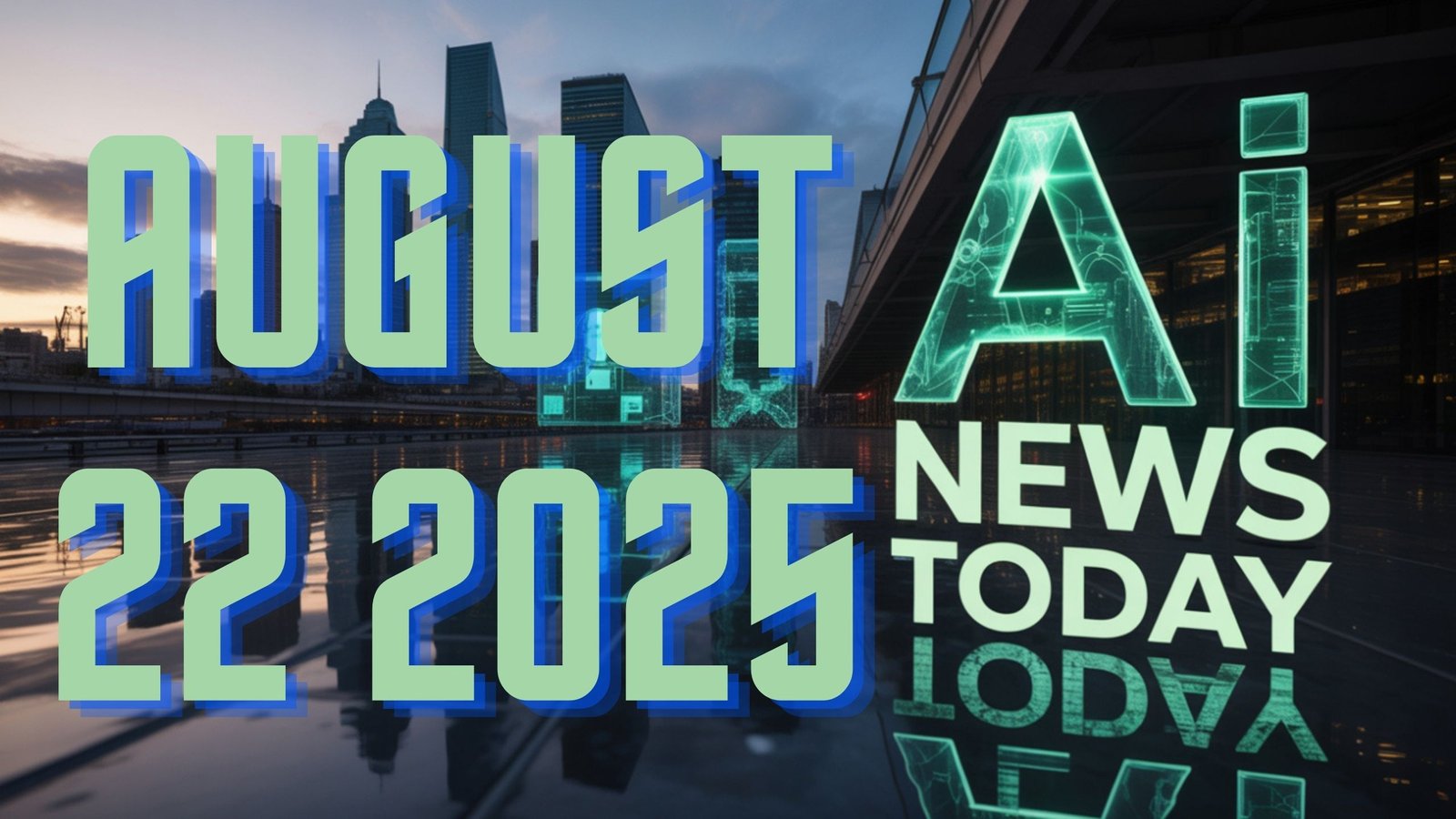AI News Daily — USA (Friday, August 22, 2025)– Artificial Intelligence continues to dominate headlines across the United States, with major announcements, corporate strategy shifts, and government initiatives shaping the future of technology. Below, we cover today’s top AI news stories in the USA with in-depth analysis of their implications for business, government, and global competition.
Google Launches “Gemini for Government” AI and Cloud Suite
Today, Google announced a groundbreaking initiative called “Gemini for Government,” a comprehensive AI and cloud services platform designed exclusively for U.S. federal employees and agencies.
The pricing is strikingly symbolic: just $0.50 per government agency for a year. Google aims to accelerate AI adoption across government institutions, reducing entry barriers and ensuring broad participation.
The suite includes:
- Gemini Models – These are the most advanced AI systems built by Google and optimized for research, decision-making, and language tasks.
- Enterprise Search & NotebookLM – Tools for knowledge management and collaborative documentation.
- Veo for Video AI – A specialized model designed for real-time video insights and multimedia generation.
- AI Agents for Research – Automated systems capable of conducting deep-dive analysis across massive datasets.
- Robust Security Features – Designed with compliance and cyber-resilience as core principles.
This initiative aligns with the US AI Action Plan and the OneGov Strategy, focusing on AI standardization, national security compliance, and scalable infrastructure.
Impact on U.S. AI Policy
Google’s move signals a deepening partnership between Big Tech and federal agencies, aimed at strengthening digital sovereignty and preventing over-reliance on foreign providers. It also positions Google at the heart of America’s AI governance ecosystem.
Nvidia CEO Visits TSMC Amid Rising U.S.-China AI Chip Tensions
Jensen Huang, CEO of Nvidia, visited Taiwan Semiconductor Manufacturing Company (TSMC) in Taipei this week, a significant event against the backdrop of escalating U.S.-China chip wars.
The U.S. government continues to impose strict export controls on AI chips destined for China, limiting access to Nvidia’s A100 and H100 GPUs, which are critical for training and deploying large-scale AI models.
Huang’s visit highlights Nvidia’s balancing act:
- Maintaining TSMC Partnerships – Ensuring production continuity as TSMC remains the world’s largest advanced semiconductor manufacturer.
- Navigating U.S. Export Policy – Engaging with Washington to define clear boundaries for AI chip distribution.
- Mitigating Risks of Chinese Retaliation – China is rapidly investing in domestic alternatives, raising competitive stakes.
Strategic Importance
This development underlines the geopolitical nature of AI hardware, with chips serving as the new oil of the 21st century. The U.S. seeks to retain technological dominance, while Nvidia remains both a supplier of innovation and a flashpoint in U.S.-China relations.
MIT Study: Businesses Struggle to Profit from AI Investments
A new MIT study reveals sobering statistics about the real-world impact of AI adoption in business. Despite $30–40 billion invested globally in generative AI tools like ChatGPT, Copilot, and enterprise copilots, only 5% of companies reported significant financial returns.
Key findings:
- 95% of organizations implementing AI saw no measurable profit increase.
- Most benefits were limited to individual productivity improvements, not enterprise-wide transformation.
- AI applications mainly reduced outsourcing expenses and manual workloads, rather than driving new revenue.
The Warning for Businesses
The study urges leaders to temper AI hype with realistic expectations. While AI adoption boosts efficiency, it does not automatically translate to higher profits. Instead, success depends on strategic integration, skilled workforce training, and identifying industry-specific use cases.
Debate Intensifies Over AI Replacing Junior Workers
A growing divide is emerging among industry leaders on whether AI should replace junior employees.
- Matt Garman, CEO of AWS, criticized the idea, labeling it “unwise and short-sighted.” He emphasized that entry-level roles are essential for skill development, mentorship, and corporate growth.
- In contrast, OpenAI and Anthropic executives forecast that up to 50% of entry-level white-collar jobs may disappear within five years due to automation.
- Experts caution that the public is largely unaware of this impending disruption, raising concerns about workforce displacement and reskilling gaps.
What It Means for the Future Workforce
This debate highlights the ethical and economic dilemma surrounding AI adoption. While automation promises efficiency and cost reduction, it risks creating a lost generation of workers who may never gain foundational career experience. The outcome will shape the coming decade’s labor markets, education systems, and corporate hierarchies.
U.S. AI Leadership Strategy: Building the Full-Stack Advantage
The White House continues to drive an ambitious AI leadership agenda to establish the United States as the global artificial intelligence hub.
The strategy emphasizes a “full stack” approach, which includes:
- Foundational Models – Leading in large-scale AI systems like GPT, Gemini, and Claude.
- Cloud Infrastructure – Expanding global access to American-owned platforms.
- AI Hardware – Retaining dominance in GPU and semiconductor production.
- Regulatory Influence – Setting global standards for responsible AI adoption.
Why It Matters
This push is not only about technological superiority, but also about geopolitical security. The U.S. views AI leadership as critical to competing with China’s rapidly expanding AI ecosystem, ensuring democratic nations adopt American infrastructure over Chinese alternatives.
Wrap Up: The AI Future of the USA
From Google’s government AI suite to the geopolitics of Nvidia chips and the debate over AI’s impact on jobs, today’s stories highlight one undeniable truth: Artificial Intelligence is now central to America’s economic, political, and social future.
As policymakers, companies, and global leaders navigate this rapidly evolving landscape, the coming years will define who leads the AI race and who falls behind. The U.S. strategy appears clear—invest, regulate, and dominate the AI value chain.

Selva Ganesh is a Computer Science Engineer, Android Developer, and Tech Enthusiast. As the Chief Editor of this blog, he brings over 10 years of experience in Android development and professional blogging. He has completed multiple courses under the Google News Initiative, enhancing his expertise in digital journalism and content accuracy. Selva also manages Android Infotech, a globally recognized platform known for its practical, solution-focused articles that help users resolve Android-related issues.




Leave a Reply